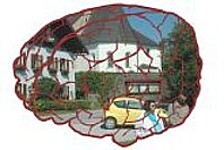Think Camp Rural Development: addressing current economic, environmental and social challenges
07 - 13 July 2024
Czech University of Life Science (CZU), Prague, Czech Republic
Background of Summer School / Introduction
The Think Camp is a traditional activity on international cooperation within the university network Euroleague for Life Sciences. It is organized by faculties and departments of universities that are members of ELLS, focusing on issues of economics, management, and social sciences. The Think camp is also open to students from other universities. It addresses rural development issues with interdisciplinary views and aims to bring together students and teachers from various countries and disciplines to discuss relevant topics, exchange knowledge and experience, gain ideas to improve the quality of students’ theses and improve their skills in solving practical problems.
Maximum number of participants
20
Pre-requisites
Think Camp is dedicated to Master students and Ph.D. students, who deal with rural development.
Application
Please fill out the online application here.
Application deadline
30 April 2024
Activities prior to Think Camp
Students will prepare a paper related to the topic of the Think Camp. In addition, students will provide comments and feedback on other students' papers, which will be discussed during the Think Camp.
Course Content
Issues of rural development from economic, social and environmental perspectives
Intended Learning Outcomes (ILO)
After completing the course, the participants should be able to...
Knowledge:
- graduates will gain knowledge realated to the European rural area in terms of its economic, environmental and social sustainability.
Skills:
- graduates will understand the issue of rural development both from a theoretical and practical point o fview based on learning real problems in practice.
Competences:
- graduates will be able to apply the acquired knowledge and skills both in further studies and in solving problems in practice (to communicate with experts, apply their own judgement, apply theoretical knowledge in decision-making and management etc.)
Course Schedule
| July 7 | opening the summer school |
| July 8 | teaching day |
| July 9 | field trip |
| July 10 - 11 | teaching days |
| July 12 | case study defence, the official closing of the summer school |
| July 13 | optional cultural programme |
Course Language
English
Course Format/Teaching Mathods
The course consists of two basic parts: Preparatory activities and an in-person summer school.
Preparatory activities (prior the summer school): Elaborating an article realated to the topic of the summer school; review of two articles of other participants.
In-person summer school: Combination of lectures (delivered by ELLS teachers), presentation and defence of students' papers (elaborated articles), field trip aimed at gathering information for a case study, case study elaboration, its presentation and defence.
Type of Assessment and Assessment Criteria
The type of assessment is a certificate with classification and awarding of credits.
Assessment criteria:
- proving knowledge and understanding of the topics in the prepared articles based on their presentation and defence;
- proving the ability to evaluate other authors' articles appropriately;
- proving the ability to solve and defend a practical rural development project.
Number of Credits
| Number of Credits [ECTS] | 4 |
| Total workload [hours] | 100 |
| Student's own work [hours] | 50 |
| Contact classes [hours] | 44 |
| Exam [hours] | 6 |
Cultural Activities / Social Program
Prague sightseeing, cultural event in a rural area, opening and closing party, optional cultural programme
Costs
320 EUR (payment before June 20)
290 EUR (early payment before May 31)
A cancellation fee of 250€ has to be paid if a student cancels his or her participation after June 21, 2024.
Costs include:
- accommodation at the CZU (student residence, available from July 7 to 13, 2024)
- meals
- excursion
- welcome reception
- online Think Camp proceedings
Travelling costs to and from Prague, Czech Republic are not covered. Students should ask the IROs of their home universities for possible financial assistance or grants.
Accommodation
CZU dormitories (university campus)
Health insurance
Handled by participants
Visa
For EU residents visa is not needed.
For non-EU residents, handled by participants.
Contact person for scientific questions
Karel Tomšík
Contact person for administrative questions
Veronika Brecklová

